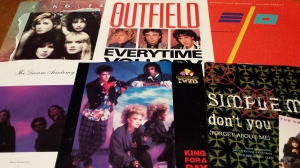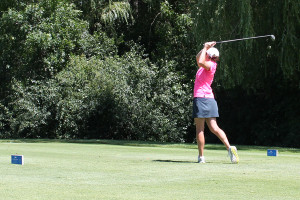This past weekend I spent two days at Brown Deer Golf Course watching 144 professional golfers on the Symetra Tour battle it out in the PHC Classic. The Symetra Tour is the step before advancing to the LPGA and the top 10 finishers on the Symtra Tour at the end of the year will earn their way onto the LPGA Tour.
9 Tips on How to Be One of the Best in the World
August 6, 2015 by 1 Comment
These players are among the top 400 women golfers in the world. I was surprised at the low attendance. Although it was the inaugural tournament, I expected more people. After all, these are some of the best golfers in the world. Who doesn’t want to watch the best?
The crowd demographic leaned towards the older spectator. There should have been more young people there. Every high school and college golf coach in Southeastern Wisconsin should have had their teams out there to watch how professionals play the game. They missed a special treat.
Watching how these women approach golf was an education. There were lessons that I can apply on the golf course, but they can also be applied in every day life.
Here are 9 tips on how to be one of the best in the world:
1) Devote time to practice. The driving range and practice green were packed. Each golfer started their practice session about two hours before their round. Then they went out and played for five hours in the hot, humid conditions. Instead of going in and calling it a day, many of them went back to practice some more; fine tuning their swing or working on their putting.
How often do we fine tune our skills? Do we take the time to get better? Do we go back over that thing that wasn’t quite right just to see if we can improve?
2) Learn from your mistakes and your successes. Players on the course take notes while they play. In their notebook, they’ll jot down what club they hit, where the ball went, what the conditions were so when they play that same hole again they’ll have an idea of how to approach things. They’ll know what’s worked for them or what hasn’t. They play from a position of strength and leave guesswork or chance out of the equation.
Keep notes of short cuts or tips that you can use later. When I was a team leader at AT&T I would keep a copy of every unique situation I ran into and what action I took to fix the problem. After time, I had built up a mini-encyclopedia. My peers and managers would send complex or weird situations my way because they knew I knew how to fix them.
3) Practice consistency. Every time the golfers step up to the ball, whether that’s on the tee box, in the fairway, or on the green, each golfer goes through their own unique routine. When they hit the ball they weren’t far off their target. And there wasn’t one miss-hit. Watching them was like observing the mechanism inside a pocket watch.
That level of consistency is hard to find. When you’re in that rhythm or groove it’s an amazing feeling. The goal is to get to that state as often as we can. Consistency can lead to good results.
4) Act like a professional. Golf is a game of tradition. These golfers respect the game, the players, the course, the volunteers, and the spectators. They play the game how it should be played. The golfers have confidence in their abilities but they didn’t show an ego.
Etiquette is another important component. There was no goofing around, foul language, temper tantrums, or loud talking. The don’t show up their opponent. They extend courtesy to the other players.
Do we act like professionals or amateurs? Do we understand the rules, the history, and the inner workings of the industry we work in? Does our ego get the best of us?
5) Know when to ask for help. Each golfer can only rely on their abilities on the course. It’s ultimately up to the golfer what shot to hit and to execute on it. At the end of the day it’s their name on the leaderboard.
Behind every golfer is a team, some on the course and some behind the scenes. 90% of the women had a caddie with them. They’d ask the caddie the distance to the hole, what club to hit, and how to read the green; getting the perspective from another set of eyes.
A friend caddied during the tournament. Because the golfer he caddied for was nursing an injury she did not play any practice rounds, so the first time she played the course was during the opening round of the tournament. My friend knew the course and he helped her when needed. She could take the information to make a better decision on what to do next.
If a caddie or coach is good enough for a professional it should just as good for us. Good advice from a trusted friend can be invaluable.
6) Play your game. 144 women competed in the tournament. Every one of them had a different swing and a different approach to the game, although there were many similarities. Some of the women could just crush the ball, others couldn’t. It didn’t matter. They played to their strengths.
We often see others accomplish something and we try to copy what they do. Copying can be good in some regards, it can give us a blue print to success but we won’t be our best until we start to consistently do things in our own unique way. We need to ignore the competition and be true to ourselves.
7) Take calculated risks. Most times playing conservative golf is the way to go, but if you play aggressively at the right time it can pay off. The question is when is the right time to take a chance?
The golfers played their game and waited until a situation presented itself where it would be okay to be aggressive. When the downside wasn’t that bad and the upside was good, the golfers took chances. They were strategic in their decision making. They may be presented with an opportunity like that a few times a round. They waited for those moments.
You won’t always guess right when taking chances, but taking them when you know your success rate is higher than normal is a good time to attempt it. Don’t force it. Wait for the opportunity to come to you.
8) Focus on what’s in front of you. Golf is the ultimate game of living in the moment. You need to have laser-like focus on the shot at hand and only that shot. You can’t jump ahead and you can’t think about the past.
The golfers took their time and studied each shot for a long time before addressing the ball. Sometimes they’d step back and reconsider the shot again.
I’m like many of you. I’ve got so many thoughts running through my head and so many things competing for my time that I am easily distracted. When I’m focused I can churn out work without even feeling time pass. I need to get to that state more often.
9) Play with the big picture in mind. The PHC Classic was a three day event. Sometimes tournaments are four days. Golfers know that one bad shot isn’t going to ruin their round. They deal with what’s in front of them and move on to the next shot.
We think one mis-step is going to doom our project or ruin our career. A golfer doesn’t think like that. For the entire three days of the tournament there were sustained winds of 20-30 miles per hour. It was windy but the golfers didn’t give up. They got on with the task at hand and dealt with the situation. We need to utilize the same mentality. We need long-term thinking.
The 9 tips on how to be one of the best in the world can help you on the course, in the office, or at home. Next time you’ve got some of the best in the world in your town, go check them out. You’ll never know what you’ll learn. What tips have you picked up watching the best do their thing?
Giving More Than What’s Expected
November 11, 2014 by Leave a Comment
 Back in the days when record albums were issued in vinyl, I used to base my decision to plop down money for the entire album on whether or not I liked the B-side of the single. My thinking was, if the B-side was good the album would be good. If the B-side was good but wasn’t on the album, the album had to be great because they had more material than they could fit on the album.
Back in the days when record albums were issued in vinyl, I used to base my decision to plop down money for the entire album on whether or not I liked the B-side of the single. My thinking was, if the B-side was good the album would be good. If the B-side was good but wasn’t on the album, the album had to be great because they had more material than they could fit on the album.
In both scenarios I was almost certain to go out and buy the album. If the B-side wasn’t that good or felt like a throw-away track I wouldn’t buy the album and figured that the band didn’t have enough good material to make a strong album.
Maybe my logic was a little harsh, but I wasn’t going to let them get any more of my money when they didn’t care about putting out a quality product. And for a 45 that meant two solid songs. Maybe some record labels or artists wanted to save their best material for the A-side of the singles when they didn’t realize that the B-side was an opportunity to give fans, and more importantly potential fans, a reason to love them.
When someone knocks your socks off you’ll brag to your friends about them. Today, people have thousands of friends in their social media contacts. When they share their experiences the ramifications can be huge.
Maybe I’m just jaded, but for me that bar is pretty low. It should be easy to impress, but sadly, that’s rarely the case. The companies that do though, reap the rewards. The ones that don’t won’t last. How to do it? Give more than what’s expected.
Gary Vaynerchuk talks about this a lot. He says the key to success is to care…a lot. Giving more than what’s expected is caring in it’s truest form. People don’t forget experiences, good and bad. Do your best to make it memorable by giving more than what’s expected and you can turn an okay experience into one that’s special.
Have you been impressed with a company that went above and beyond? What did they do that was different? How do you give your customers more?
What Playing the Bluebird Café Taught Me About Being the Best
April 22, 2014 by 3 Comments
 In 1998, I went to play the famous Bluebird Café in Nashville, TN. If you’ve never been there, the atmosphere is intimate. It’s dark and cozy, and it only holds about 90 people. Many stars were discovered there; Garth Brooks, Kenny Chesney, and Keith Urban to name a few. At the time, I thought about moving to Nashville and making it as a songwriter. The Bluebird Café was the place to go and judge where I stood against every other aspiring songwriter. It still is.
In 1998, I went to play the famous Bluebird Café in Nashville, TN. If you’ve never been there, the atmosphere is intimate. It’s dark and cozy, and it only holds about 90 people. Many stars were discovered there; Garth Brooks, Kenny Chesney, and Keith Urban to name a few. At the time, I thought about moving to Nashville and making it as a songwriter. The Bluebird Café was the place to go and judge where I stood against every other aspiring songwriter. It still is.Every Monday is open mic night, when all the amateurs get to showcase their talent. When I showed up the turn out was huge. There were people in line from all over the country, some had just gotten to town that day! I didn’t make it to the stage that night, but luckily I was still in town the following Monday, so I was assured of playing then.
When I got my chance to go onstage, I was nervous. I played two songs to polite applause. The thing is, songwriters pull for other songwriters. They aren’t the ones in the spot light generally; unless they also happen to be an artist, and the general atmosphere was “let’s support each other and listen to some great tunes.” It was an amazing experience.
I saw and heard some impressive, and some not so impressive, singer/songwriters during the two Monday nights I was there. Some songs were so well crafted that I could already hear them being played on the radio, they were that good. Some were just plain forgettable.
Of the roughly 100 songs I heard (50 songwriters singing two songs each), I placed my songs somewhere in the middle of the pack. Though there were mostly country songs sung (I was more a pop/rock songwriter), songs are songs to me. I was better than average if I broke it down by genre.
It was a big lesson. I thought I’d come in there and people would be blown away by my songs and I’d be discovered. Granted, this probably wasn’t the best venue for my material, but it was still putting my work up against the best.
I’m sure every Monday night half of the songwriters on the stage at the Bluebird Café are playing it for the first time. Many people have the same dreams. I bet a lot of them are the best songwriters in their hometown. When you line up against the best of the best it’s not so easy to stand out. It shows how tough competition is.
It’s good to be confident in your abilities. Playing the Bluebird Café didn’t make me think any less of myself as a songwriter. It presented me with a great opportunity to see what other songwriters are doing.
If I hadn’t gone, I wouldn’t know how I stacked up against other songwriters. We all want to know that we’re competent. Performing at the Bluebird Café verified that I was. If you never measure yourself against the real world how will you know whether you’re on track, you need an adjustment, or you need to try something else entirely.
It’s like those singers who audition on American Idol who have been told their entire lives that they’re talented, but when they can’t sing and they get rejected they are shocked. There’s no better barometer of your talent than going up against others who do what you do. It can reassure you or it can open your eyes.
That being said, there’s always someone out there who can do what you do better than you can, but they can’t do it exactly like you. That’s the thing. You bring your talents to the world, no matter what they are, in a special way that no one else can.
So, don’t give up when it seems like you aren’t succeeding or aren’t stacking up against others the way you think you should. If you are being the best version of you possible, that’s the best you can hope to accomplish. Others will flock to you for that.

Follow Me!